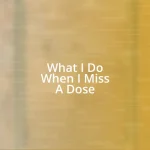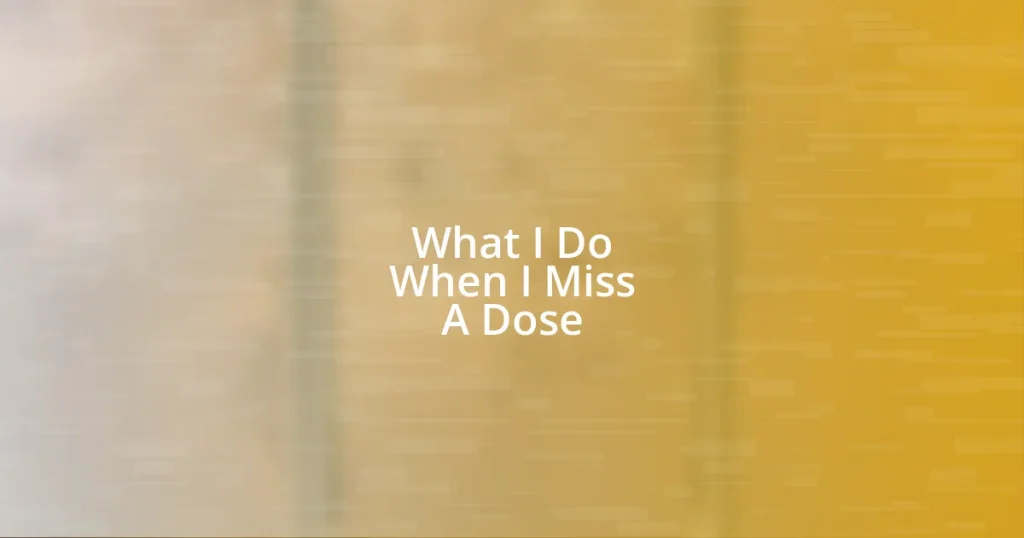Key takeaways:
- Medication adherence is essential for effective treatment and emotional well-being, as missing doses can lead to a cascade of negative physical and emotional effects.
- Common reasons for missed doses include busy schedules, forgetfulness, unpleasant side effects, travel disruptions, and changes in medication regimens.
- Establishing a reliable routine through reminders, pairing medications with daily habits, and seeking accountability from others can significantly improve adherence.
- Utilizing technology, such as tracking apps and support communities, along with tools from local pharmacies, can enhance medication management and adherence strategies.

Understanding medication adherence
Medication adherence is crucial for achieving the desired effects of treatment. I remember the times when I was juggling my busy schedule and unintentionally skipped doses, thinking it was no big deal. But, have you ever wondered how even one missed dose can undermine your progress? It’s astonishing how a little oversight can ripple through our health journey.
When I finally understood that sticking to my medication schedule was as important as taking the medication itself, things started to change. I felt more empowered and responsible for my health. I once missed a dose right before a big work presentation and it shook my confidence; it made me realize that medication isn’t just about managing symptoms—it’s a commitment to oneself.
Emotions often play a significant role in adherence. There was a time when I struggled with the side effects of a new medication, leading me to question whether I should continue taking it. I found myself asking, “Is this worth it?” It’s these emotional hurdles that many face, and acknowledging them is the first step toward better adherence.
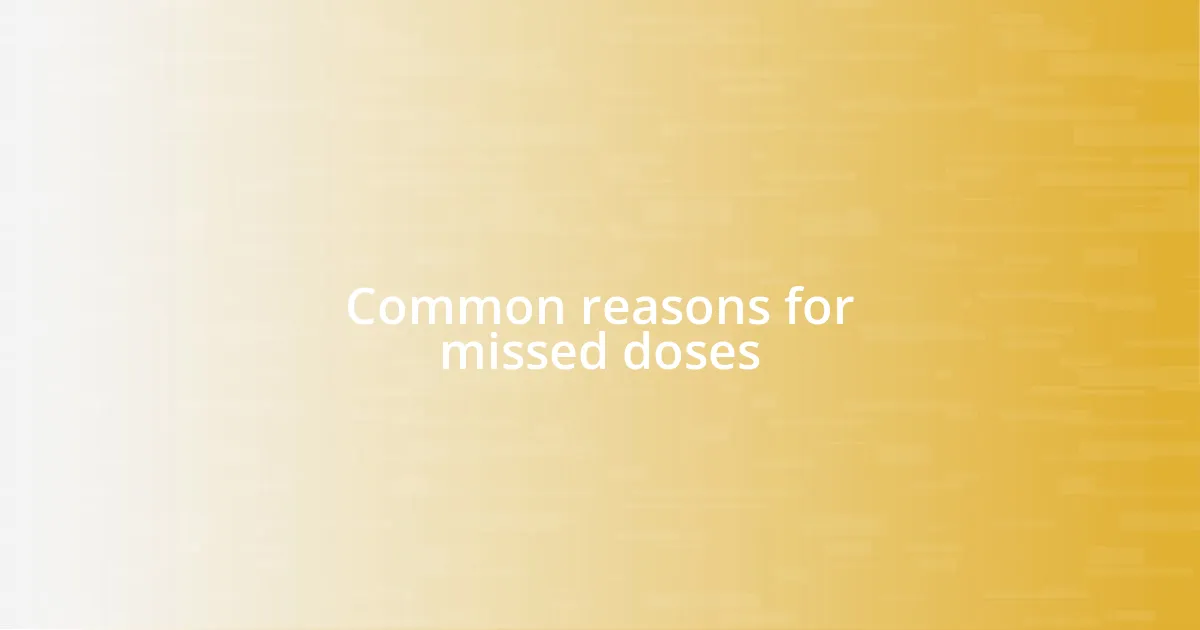
Common reasons for missed doses
It’s interesting how we can all find ourselves in situations where doses are easily missed. Often, the reasons for skipping medication are quite relatable. For me, mornings can be chaotic, especially when I’m rushing to get out the door. Sometimes, in the flurry of getting the kids ready or preparing for the day ahead, I unintentionally forget that crucial dose.
Here are some common reasons why doses get missed:
- Busy schedules: Life can be hectic, and it’s easy to overlook taking medication.
- Forgetfulness: Even the best of us can simply forget, especially if we’re not in a routine.
- Side effects: Experiencing discomfort can lead some to skip doses to avoid unpleasant sensations.
- Travel: Being away from home can disrupt regular medication routines.
- Medication changes: Starting or stopping medications can create confusion about what to take and when.
Reflecting on my own missteps, I recall a time on a weekend getaway. I was eager to enjoy my time away and let my routine slip. I paid for it later when I felt the difference in energy levels. It’s a vivid reminder of how even small disruptions can have a noticeable impact.
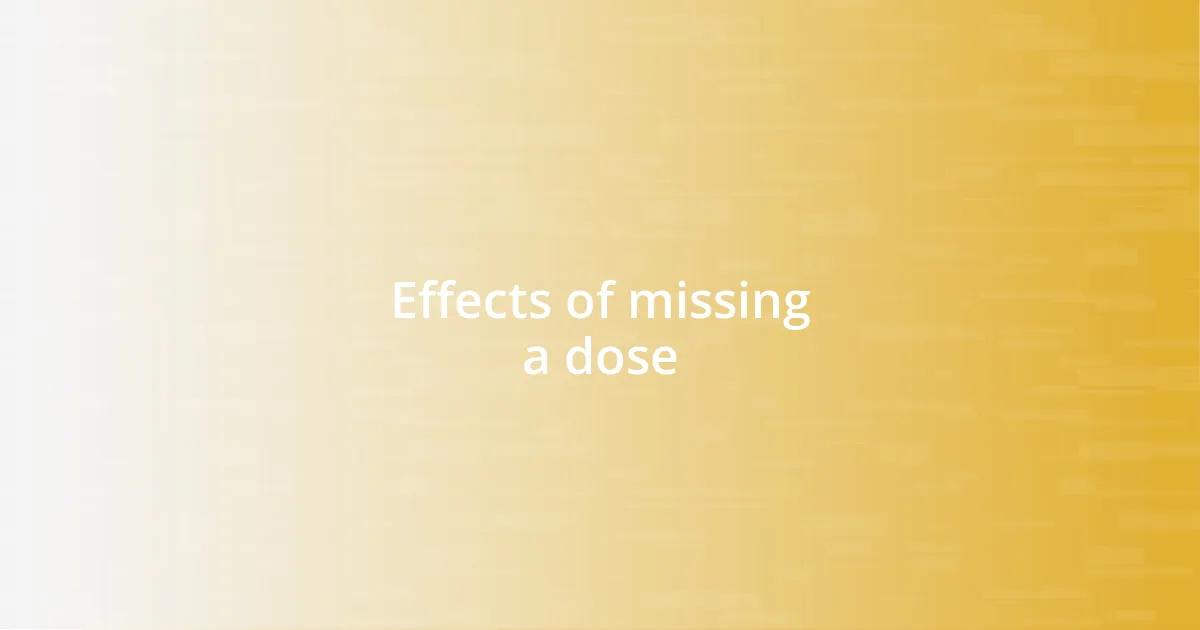
Effects of missing a dose
Missing a dose can create a cascade of effects that might surprise you. I once skipped a dose of my anxiety medication during a particularly stressful week. The immediate effect was a noticeable increase in my anxiety levels—like a fog settling in, clouding my thoughts and making everything feel overwhelming. Have you ever experienced that sense of being thrown off balance by something seemingly small? It’s a powerful reminder of how tightly woven our bodies and medications can be.
The longer-term effects can be just as significant. When I missed my blood pressure medication a few days in a row, I started to feel the physical ramifications. I noticed my heart racing unexpectedly during moments of calm, which left me feeling uneasy. Over time, I’ve learned that one missed dose might not seem like a big deal, but it can accumulate, leading to more persistent issues down the line. It’s crucial to find strategies that work for you to stay on track, as I’ve discovered through my own experiences.
Moreover, the emotional toll can amplify these physical effects. Missing a dose can lead to feelings of guilt or frustration, especially when I realize that I slipped up again. I remember a time I had promised my doctor I would stick to my regimen, and missing a dose felt like letting myself down. This emotional weight only adds to the anxiety and stress of the situation. By recognizing these feelings, I’ve found ways to support myself better and stay committed to my treatment plan.
| Short-Term Effects | Long-Term Effects |
|---|---|
| Increased anxiety levels | Raised blood pressure |
| Feeling overwhelmed | Persistent symptoms |

Consulting with healthcare providers
Consulting with healthcare providers is a vital step when you miss a dose. I remember one particular occasion when I skipped my arthritis medication. I felt a dull ache creeping back in and decided to call my rheumatologist. Discussing my concerns openly made me realize how much I relied on their expertise, and they provided me with personalized advice on resuming my regimen safely. It’s surprising how just a brief conversation can alleviate your worries.
When I consult with my healthcare provider, I often find myself wondering if I’m using the right approach to manage missed doses. Have you ever thought about how different medications might require different actions? For instance, while some medications allow for flexibility, others may require immediate adjustment. During a recent appointment, my doctor shared insights on how to handle specific situations, which made a world of difference in my understanding.
It’s also helpful to keep the lines of communication open. I try to maintain a list of questions or concerns to bring up during my visits or calls. Once, I had a concern about a side effect that was making me dread taking my medication. When I voiced this to my provider, not only did they offer solutions, but they also reassured me that I’m not alone in this. It’s comforting to know that discussing these moments of struggle can lead to better management strategies, which simply enriches my experience with my health journey.
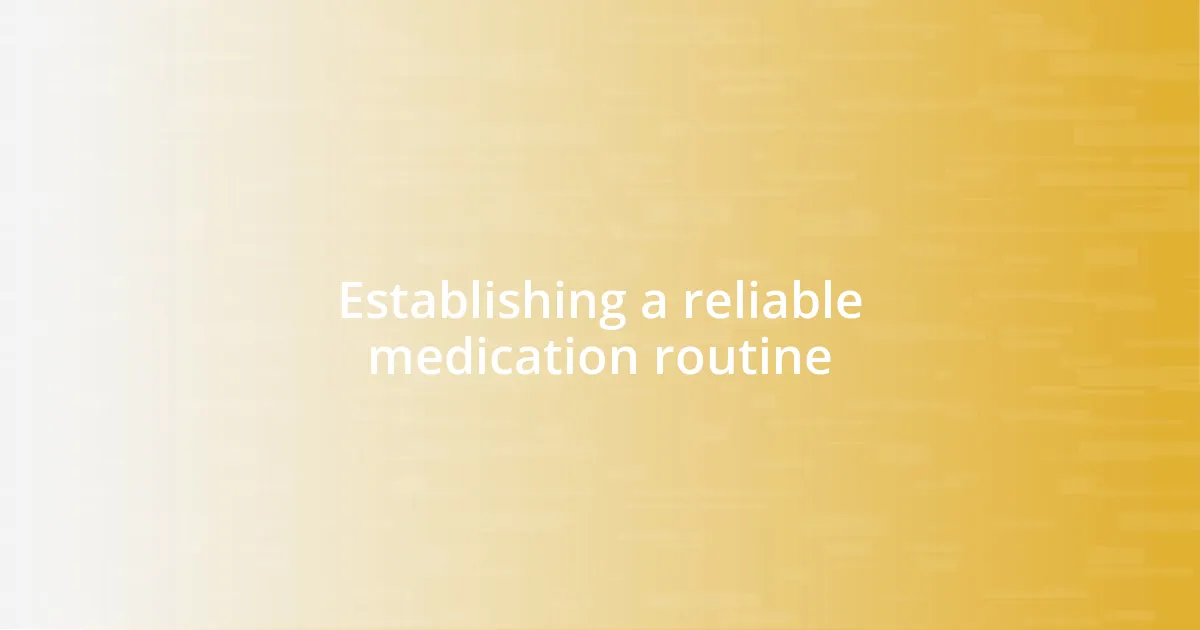
Establishing a reliable medication routine
Establishing a reliable medication routine can feel like a balancing act, and I’ve learned a few tricks along the way. For example, I found that setting alarms on my phone was a game changer. Initially, I thought it would be annoying, but having that gentle reminder pop up at the same time each day created a comforting rhythm in my schedule. Do you ever struggle to remember your routine? You’re not alone; simple reminders can significantly reduce that mental load.
Another strategy I’ve adopted involves pairing my medication with daily habits. I’ve started to take my pills alongside morning coffee or right after brushing my teeth, which has helped me to associate the two actions. This method allows my brain to link the routine, making it feel less like a chore. I vividly recall the first week I tried this—how strange it felt to integrate medications into my life so seamlessly. Have you ever thought about the power of conditioning in your daily activities?
Finally, I’ve realized the importance of accountability, whether through family, friends, or even support groups. When my sister offered to check in with me about my medications, it suddenly transformed my approach. Knowing I had someone counting on me encouraged me to prioritize my regimen seriously. There’s something about having a partner in this journey—it reminds us that we’re not alone in our struggles. Have you considered who might support you on your path? Building that foundation can make all the difference.
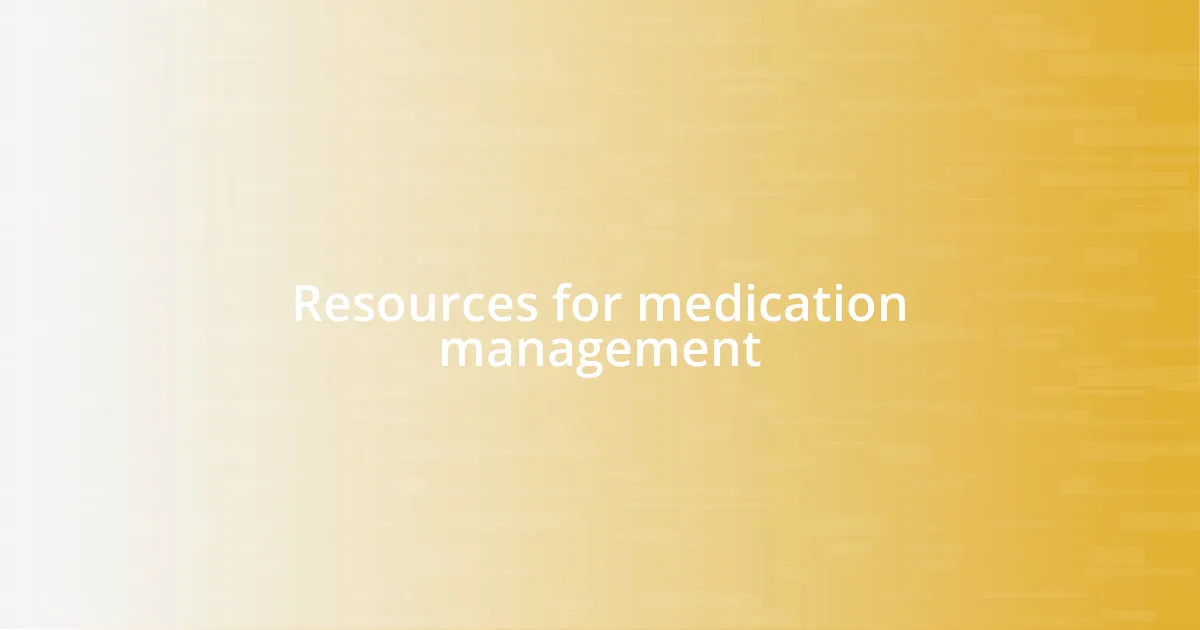
Resources for medication management

Using tracking apps for medication management
In my quest for better medication management, I stumbled upon several tracking apps that completely transformed how I keep tabs on my doses. One app, in particular, has a simple interface where I can log each dose and even set reminders for when it’s time to take my medication. I remember feeling overwhelmed by the number of pills I had to take, but seeing a visual representation of my schedule made it way more manageable. Have you ever used technology to help streamline your health routines?
Another resource I’ve found beneficial is joining online health communities where members share their experiences and tips. When I was trying to juggle multiple medications, connecting with others who faced similar challenges was incredibly reassuring. Just the other day, I read a post from someone who had a creative strategy for remembering to take their medication—like keeping their meds in a brightly colored jar on the kitchen counter. This simple idea sparked a change in my own setup. What small tweaks have you made to your own medication management that could inspire me?
It’s also worth exploring local pharmacies for tools such as pill organizers or medication synchronization programs. Just the other week, my pharmacist suggested a weekly organizer that helped me see whether I had taken my doses for the week. I was honestly surprised at how much clarity that little device brought to my day-to-day routine. Isn’t it fascinating how sometimes, a simple solution can lead to a significant improvement in managing our health? I often remind myself that these resources are out there, just waiting to be discovered.








